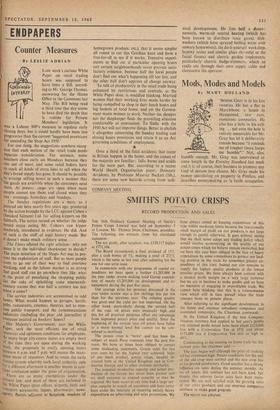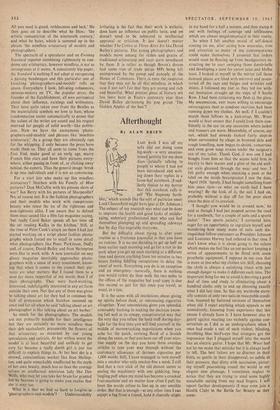Mods, Modes and Models
By MARY HOLLAND
All you need is greed, ruthlessness and luck.' He then goes on to describe what he likes: 'the artistic romanticism of the nineteenth century,' and what he hates, which is summed up in the phrase 'the mindless aristocracy of models and photographers.'
The spectacle of a speculator and an Evening Standard reporter combining righteously to con- demn any aristocracy, however mindless, is not as incongruous at it seems. A consciously hip paper, the Standard is nothing if not adept at recognising a pas-sing bandwagon and this particular one of knocking 'photographers-and-models' rolls on apace.. Everywhere I look, left-wing .columnists, opinion-makers on TV, the popular press, the founder of the Establishment, all wax puritanical about their influence, earnings and witlessness. They have quite taken over from the Beatles as the materialistic symbols we love to hate, whose condemnation seems automatically to prove that the values of the writer are sound and his respect reserved for people of solid worth—like politic- ians. .Now we have the anonymous 'photo- graphers-and-models' and phrases like 'mindless aristocracy.' As a group they are obviously ripe for the whipping, if only because the press have made them so. They all seem to come from the , East End, make good at an early age, marry French film stars and have their pictures every- where, either posing in front of, or clicking away behind, the camera. Thus the general image: break it up into individuals and it is not so convincing.
For a start just who make up this mindless aristocracy? Steichen with his Family of Man pictures? Don McCullin with his piteous shots of war? Ian Berry with his pictures of Sharpeville? No, of course not. It is the fashion photographers and their models who work with conspicuous beauty who rouse the ire of the righteous and non-righteous alike. I am aware that to defend them must sound like a film fan magazine saying, 'but really Carol Baker spends all her time off the set reading Kafka in the kitchen.' Still, at the time of Peter Cook's attack on them I had just started working on a script about fashion photo- graphy which forced me to recall in some detail what photographers like Penn, Parkinson, Duffy and, of course, David Bailey and Jean Shrimpton were like to work with A new journalist on any glossy magazine inevitably approaches photo- graphers with a sense of wary resentment, know- ing that when it comes to the crunch their pic- tures are what matters. But I found them to a man far more respectful of my words than I of
their photographs. They were hard-working, interested, indefatigably interested in any art form outside their own. Not that any of them was given to talking about art for they had in common the lack of pretension which Steichen summed up once and for all when he said 'talking about an art photographer is like talking about an art barber.' So much for the photographers. The models are not primarily notable for their intelligence but they are certainly no more mindless than their deb equivalents, presumably the flowers of that aristocracy so mourned by our young speculators and satirists. At her witless worst the model is at least beautiful and unlikely to get very far because a really dumb girl is just too difficult to explain things to. At her best she is a shrewd, conscientious worker like Jean Shrimp- ton, and quite remarkably unaffected by the myth of her own beauty, much less so than the average actress or intellectual television lady like Dee Wells, who may let you take her brain for granted but by heavens is going to make you realise that she is sexy too.
What is, it that we find so hard to forgive in 'photographers-and-models'? Understandably
irritating is the fact that their work is wsthetic, does have an influence on public taste, and yet doesn't need to be subjected to intellectual approval or criticism. It just doesn't matter whether The Critics or Three Alter Six like David Bailey's pictures. The young photographers and models move among the riches and graces of traditional aristocracy and seem quite unseduced by them. It is rather as though Bevan's dream had come true of trade union MPs being left unimpressed by the pomp and panoply of the House of Commons. There is even the,suspicion that they may not be all [hit mindless, in which case it just isn't fair that they.are young and rich and beautiful. What prettier piece of literary wit has there been in Yeats's centenary year than David Bailey christening his pop group 'The Golden Apples of the Sun'?



































 Previous page
Previous page